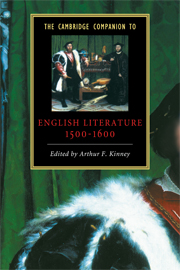Book contents
- Frontmatter
- 1 Introduction
- 2 The sixteenth century
- 3 Tudor aesthetics
- 4 Authorship and the material conditions of writing
- 5 Poetry, patronage, and the court
- 6 Religious writing
- 7 Dramatic experiments
- 8 Dramatic achievements
- 9 Lyric forms
- 10 Narrative, romance, and epic
- 11 The evolution of Tudor satire
- 12 Chronicles of private life
- 13 Popular culture in print
- 14 Rewriting the world, rewriting the body
- 15 Writing empire and nation
- Index
3 - Tudor aesthetics
Published online by Cambridge University Press: 28 May 2006
- Frontmatter
- 1 Introduction
- 2 The sixteenth century
- 3 Tudor aesthetics
- 4 Authorship and the material conditions of writing
- 5 Poetry, patronage, and the court
- 6 Religious writing
- 7 Dramatic experiments
- 8 Dramatic achievements
- 9 Lyric forms
- 10 Narrative, romance, and epic
- 11 The evolution of Tudor satire
- 12 Chronicles of private life
- 13 Popular culture in print
- 14 Rewriting the world, rewriting the body
- 15 Writing empire and nation
- Index
Summary
What is “literature”? Who writes it, and who reads it? What good or harm does it do? How is it related to other cultural forms? And what is the appropriate language and kind of writing within which these issues can be framed and argued? These simple questions, which provide the fodder for the complex aesthetic debates of the Enlightenment and the Romantic eras and for the theory wars of the late twentieth century, were likewise disputed in the sixteenth century. It is possible, indeed, to think of the sixteenth century as the first great age of literary criticism, in which a distinctive category of literature was established, and a distinctive way of talking about it and the other arts was developed. For Tudor writers and readers, the answers to these questions depend primarily on their understanding of literature as a kind of imitation. The word imitation is a complex one, though, for it allows two important meanings.
- Type
- Chapter
- Information
- The Cambridge Companion to English Literature, 1500–1600 , pp. 29 - 63Publisher: Cambridge University PressPrint publication year: 1999
- 1
- Cited by



